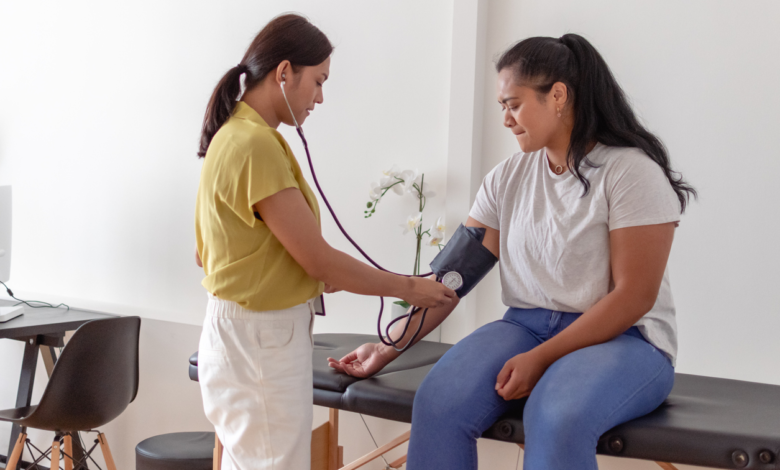Top Medications for Managing High Blood Pressure

Top Medications for Managing High Blood Pressure. High blood pressure, or hypertension, is a common yet serious condition that can lead to significant health issues if left untreated. Effective management often requires a combination of lifestyle changes and medication. Understanding the different types of medications available can help you and your healthcare provider select the best treatment plan for your needs. Here’s an overview of the top medications used to manage high blood pressure and how they work.
1. Diuretics
What Are Diuretics?
Diuretics, often referred to as “water pills,” help the body eliminate excess sodium and water through urine. This reduction in fluid volume lowers blood pressure.
Types of Diuretics
- Thiazide Diuretics: These are commonly used for hypertension and include medications like hydrochlorothiazide and chlorthalidone. They are often effective in lowering blood pressure over the long term.
- Loop Diuretics: Such as furosemide (Lasix), are usually prescribed for more severe cases of high blood pressure or when kidney function needs to be supported.
- Potassium-Sparing Diuretics: Medications like spironolactone help retain potassium while removing excess sodium, which can be beneficial in combination with other diuretics.
Potential Side Effects
Diuretics can lead to side effects such as dehydration, dizziness, and electrolyte imbalances. Regular monitoring of blood levels is important to manage these risks.
2. ACE Inhibitors
What Are ACE Inhibitors?
Angiotensin-converting enzyme (ACE) inhibitors work by blocking the formation of angiotensin II, a hormone that narrows blood vessels. By inhibiting this hormone, ACE inhibitors help relax blood vessels and lower blood pressure.
Common ACE Inhibitors
- Enalapril
- Lisinopril
- Ramipril
Potential Side Effects
Common side effects include coughing, high potassium levels, and dizziness. In rare cases, ACE inhibitors may cause angioedema, a serious allergic reaction.
3. Angiotensin II Receptor Blockers (ARBs)
What Are ARBs?
Angiotensin II receptor blockers (ARBs) prevent angiotensin II from binding to its receptors on blood vessels, leading to relaxed vessels and reduced blood pressure.
Common ARBs
- Losartan
- Valsartan
- Irbesartan
Potential Side Effects
ARBs generally have fewer side effects compared to ACE inhibitors. However, they can still cause dizziness, high potassium levels, and, rarely, kidney dysfunction.
4. Calcium Channel Blockers
What Are Calcium Channel Blockers?
Calcium channel blockers prevent calcium from entering the cells of the heart and blood vessel walls, which helps to relax blood vessels and reduce blood pressure.
Common Calcium Channel Blockers
- Amlodipine
- Diltiazem
- Verapamil
Potential Side Effects
Side effects can include swelling of the legs, dizziness, and constipation. Some people may also experience flushing or headaches.
5. Beta-Blockers
What Are Beta-Blockers?
Beta-blockers reduce the workload on the heart by blocking the effects of adrenaline. This leads to a slower heart rate and lower blood pressure.
Common Beta-Blockers
- Metoprolol
- Atenolol
- Carvedilol
Potential Side Effects
Beta-blockers can cause fatigue, cold hands and feet, and bradycardia (slow heart rate). They may also affect asthma or other respiratory conditions.
6. Alpha-Blockers
What Are Alpha-Blockers?
Alpha-blockers work by blocking alpha-adrenergic receptors in the blood vessels, which leads to relaxation and dilation of the blood vessels, thereby reducing blood pressure.
Common Alpha-Blockers
- Doxazosin
- Prazosin
- Terazosin
Potential Side Effects
Side effects include dizziness, headaches, and orthostatic hypotension (a sudden drop in blood pressure when standing up).
7. Renin Inhibitors
What Are Renin Inhibitors?
Renin inhibitors work by directly inhibiting renin, an enzyme involved in the production of angiotensin I. This helps to lower blood pressure by preventing the formation of angiotensin II.
Common Renin Inhibitors
- Aliskiren is the primary medication in this class.
Potential Side Effects
Possible side effects include diarrhea, dizziness, and high potassium levels. Renin inhibitors are less commonly used compared to other antihypertensive medications.
8. Combination Medications
What Are Combination Medications?
Combination medications combine two or more antihypertensive agents into a single pill. This approach can simplify treatment and enhance effectiveness.
Common Combinations
- ACE Inhibitor + Diuretic: For example, lisinopril and hydrochlorothiazide.
- ARB + Calcium Channel Blocker: Such as losartan and amlodipine.
Potential Side Effects
Combination medications can carry the side effects of their individual components. Monitoring and adjusting the dose may be necessary to minimize adverse effects.
Conclusion
Managing high blood pressure effectively requires a well-rounded approach that may include a variety of medications tailored to individual needs. From diuretics and ACE inhibitors to ARBs and beta-blockers, each class of medication offers unique benefits and potential side effects. Working closely with your healthcare provider can help you choose the most appropriate treatment plan and achieve optimal blood pressure control.
FAQs
How long does it take for blood pressure medications to work?
Most blood pressure medications start to show effects within a few weeks. However, it may take several months to see the full benefits and achieve optimal control.
Can lifestyle changes reduce the need for medication?
Yes, lifestyle changes such as a healthy diet, regular exercise, and reducing stress can help lower blood pressure and potentially reduce the need for medication. Always discuss any changes with your healthcare provider.
Are there any natural remedies that can complement medication?
Certain lifestyle modifications, like reducing sodium intake and increasing potassium-rich foods, can complement medication. However, always consult with your doctor before adding any natural remedies.
What should I do if I miss a dose of my blood pressure medication?
If you miss a dose, take it as soon as you remember. If it’s almost time for your next dose, skip the missed dose—do not double up. Consult your healthcare provider for specific instructions.
Can high blood pressure medications cause weight gain?
Some blood pressure medications, particularly certain beta-blockers and alpha-blockers, may lead to weight gain. Discuss any concerns with your doctor to explore alternative medications if necessary.
